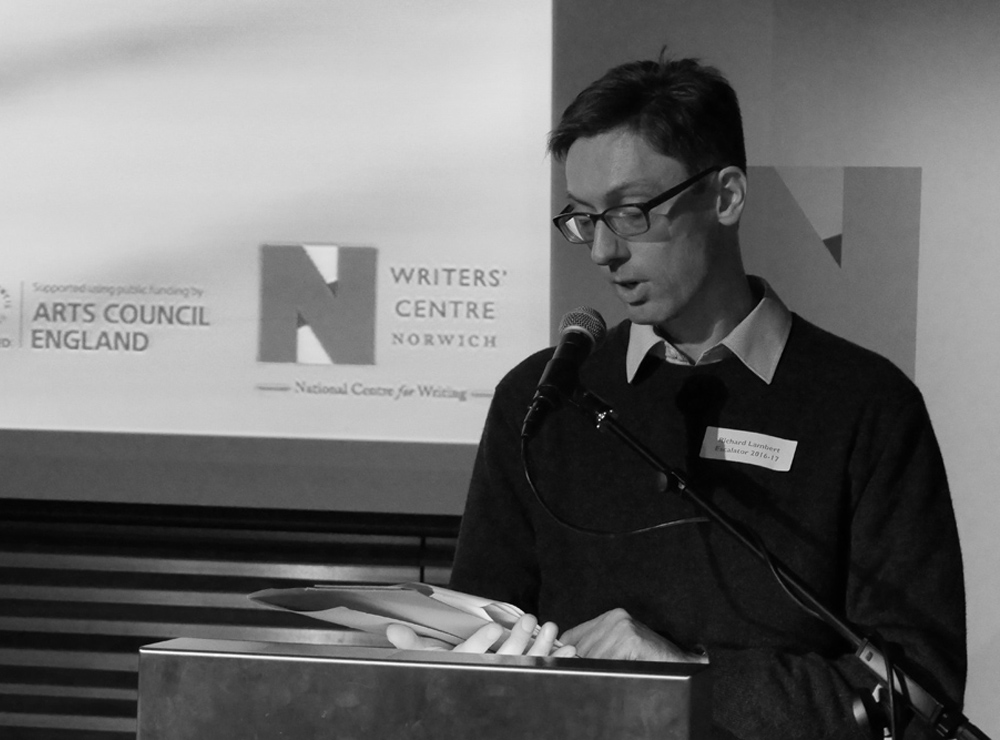
WCN is thrilled to hear that Richard Lambert, one of our Escalator writers for 2016-17, has been longlisted for the prestigious Sunday Times EFG Short Story Award.
Richard has been longlisted by The Sunday Times for his short story ‘The Hazel Twig and the Olive Tree’ – an extract of which can be read below.
Last week, Richard gave a reading from his novel in progress, The Counterfeiters, to agents and publishers at our Escalator Showcase event at the Free Word Centre in London. He was joined by his nine fellow ‘Escalatees’ to celebrate and showcase the culmination of nine months of professional development and mentoring. Read an extract from The Counterfeiters here.
Other longlisted writers include Anjali Joseph, author of The Living and a tutor on our Creative Writing Online programme; and Sally Rooney, whose short story ‘Mr Salary’ was performed as part of The Story Machine at Norfolk & Norwich Festival 2016.
The Hazel Twig and the Olive Tree:
A lost story of Jorge Luis Borges [1]
Irving Samuelson, University of Texas, Austin
In January 1935, Jorge Luis Borges lost his job as literary editor of the Saturday supplement of Buenos Aires’ mass-market daily newspaper, Crítica. One month after his departure, the supplement published a piece by a certain Herbert Lock, retelling the story of the adulterous lovers Tristan and Isolde. It has hitherto been believed that copies of this story had not survived. In fact, until now, Borges’ editorship and Lock’s Tristan story had been considered unconnected, despite the compelling arguments this author made in a 1993 article, that showed that Herbert Lock and Jorge Luis Borges were one and the same.[2] But now further evidence, refuting the glib malignities of earlier critics, namely a bill of sale from a bookshop in Jerusalem, and an interview with a member of the 1930s Argentine avant garde, have added weight to my earlier arguments and definitively show that a hitherto lost story of Jorge Luis Borges has come to light.
The supplement Revista Multicolor, which Borges co-edited with Ulyses Petit de Murat between June 1933 and January 1935, came out in Buenos Aires on a Saturday, a day of the week imprinted upon Borges’ memory, for it was on a Saturday in November 1926 in the Orangery Restaurant of Palermo Park that Borges lost his fiancé Norah Lange to another man.
This was a break so significant that it was the moment to which Borges would allude in that lost, now rediscovered, story of 1935; and it was also the moment which was to dominate the next seventy years of his life. Even once he had made the re-discovery of romantic love in old age, which allowed him finally to step from the shadow of family (he shared a flat with his mother until her death in 1975) to be with the young Maria Kodama, he still lingered over that first loss of Norah Lange. [3] So much so that it received the most oblique and final of textual references in his gravestone inscription, a line from a late, intimately autobiographical story, ‘Ulricca’, in which the memory of a lost love is finally redeemed. And thus he closed the circle on that first loss, and revealed too, how far for him the textual and biographical were merged.
The impact, then, of that meeting of Norah and Oliverio Girond, that preposterous, cruel couple (at parties Norah would stand on tables and declaim her poetry, while Oliverio once drove a funeral carriage through Buenos Aires taunting his defeated rival with a papier maché caricature of him) was long-lasting. A photograph records that Saturday when the literary elite of the city gathered in the restaurant in Palermo Park: Borges stands unaware that, though he arrived at the lunch with his girlfriend, he was to depart alone.
[1] This paper was rejected by Modern Fiction Studies. The anonymous referee, to whom I would dedicate this article were it not that he has chosen to remain nameless and that any dedication, where Borges is concerned, is owed to absence, concluded his report with characteristic cruelty: ‘notwithstanding the author’s shrill protests, this story never existed.’
[2] Samuelson, ‘A Lost Story of Jorge Luis Borges’, Hispanic Review, 44 (1993), 234-47.
[3]The household was strange: even as an old man Borges informed his mother of all his movements and each night before going to bed, would receive two sweets from the family maid like a little boy.
Visit The Sunday Times EFG Short Story Award for the full longlist.
You may also like...
‘The Meaning of Geese’ wins East Anglian Book of the Year 2023
The debut book from Norfolk conservationist Nick Acheson is crowned the overall winner of the East Anglian Book Awards

16th February 2024






